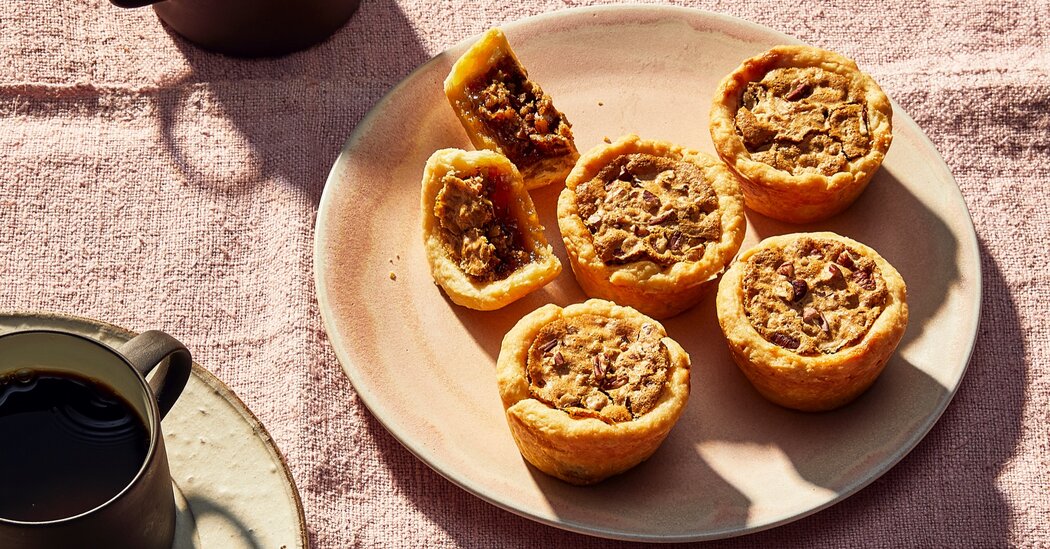
My first pecan tart came from a crush. A guy who lived next door. In the way of queer latchkey teenagers globally, we baked at his place in the afternoons. I crushed pecans. He sifted sugar. Sometimes we brushed hands, folding butter into flour. Once the tarts had been baked, we split them down the middle, until my crush became my friend, and we both grew up, and came out. We moved on to other relationships and other pleasures in other places — but I never entirely forgot about the tarts.
A pecan tart is a tiny ode to pleasure. The pastry is unobtrusive but flavorful. Cream cheese adds a waft of sweetness. Its butter pastry dissolves on your tongue, beside a pecan mixture that’s crunchy and decadent and punchy — but not so filling that you can’t chew a single tart over coffee, or gulp a handful just before you’ve set the table for dinner. For a small amount of labor, the feeling you’ll yield is immense. Whether in moderation or excess, the pecan tart is a solid hang.
On my end, pastry has always been synonymous with pleasure: Once, a boyfriend in Austin insisted that his sister’s pan dulce could cure any heartache, and for a few bites of deliciousness, this was pretty much true. I’ve been healed by anpan eaten from Shimokitazawa’s just-opened bakeries, after nights spent at gay bars, because these were the first blessings we ran into. The pandan waffles I’ve shared with buddies in Bellaire, Texas, before absurd evenings in Montrose, were both fuel and fodder; and the cream-cheese-filled kolaches dunked in coffee the following afternoons have been medicinal in themselves, canvases for reveling or mourning or simply shaking our heads at the nights before.
But I always come back to pecan tarts. They’re simple. Flavorful. You can fit like two or three in your palm.
And queerness itself is an expansion of pleasure — in this way, I’ve never divorced pastries from queerness. It matters a good deal when the pleasures of queer folks are commodified. It matters a good deal when trans folks aren’t able to access the same pleasures. And it may seem, at a glance, that tarts have nothing to do with this — but pleasure, and our memories of it, and who’s allowed to garner, and who has to fight for it — has everything to do with this. As Ruby Tandoh writes in “Eat Up,” “It makes sense that our brains would mesh taste and memory together given the scariness of the world around us.”
Whether in moderation or in excess, the pecan tart is a solid hang.
When you’re baking these tarts, your hands are the key to the recipe’s success. The dough should feel light in your fingers. Just after forming, the pastry is ready for its pan. Those same hands will dole out the filling, and they’ll also pass tarts out to lovers and friends or strangers. They’re hands that have weathered the last few difficult years — of our ongoing pandemic, rampant legislation against trans folks, an inept governmental response to this summer’s MPX outbreak and book bannings nationwide. A reminder that you’re capable of a tart’s softness — even still — is pretty astonishing.
But isn’t pastry itself a love story? Even if you know how it will (probably) end up, the pursuit is full of surprises. You mold the dough with your hands, imagining the most perfect version of itself. You make do with what you’ve conjured. Maybe next time you’ll do things differently. You’ll mold a gentler dough. Chill the butter. Bake for longer, at a higher heat, with a different filling altogether.
Lately, I’ve been sharing the tarts I bake with my person, a guy who isn’t wild for sweets. But he’ll fool around with these. We’ll parse out a batch for friends. Or, sometimes, I’ll just make a few for myself. It won’t take too long. And if I’m borrowing someone’s oven, in Vancouver or Los Angeles, where the Banana Yoshimoto line about dream kitchens comes to mind — “I know that there will be so many more” — pecan tarts are a way that I can treat my friends, and my queer friends, specifically, to pleasure; even if it’s finite and hand-held, even if for only a moment.
We’ll open the windows, chewing on the patio or the stoop or some grassy park a few blocks from home. These tarts are a reminder that we take our relationships, all of them, wherever we go, residing in our hands, in the memories of dishes we carry.
Recipe: Pecan Tarts


